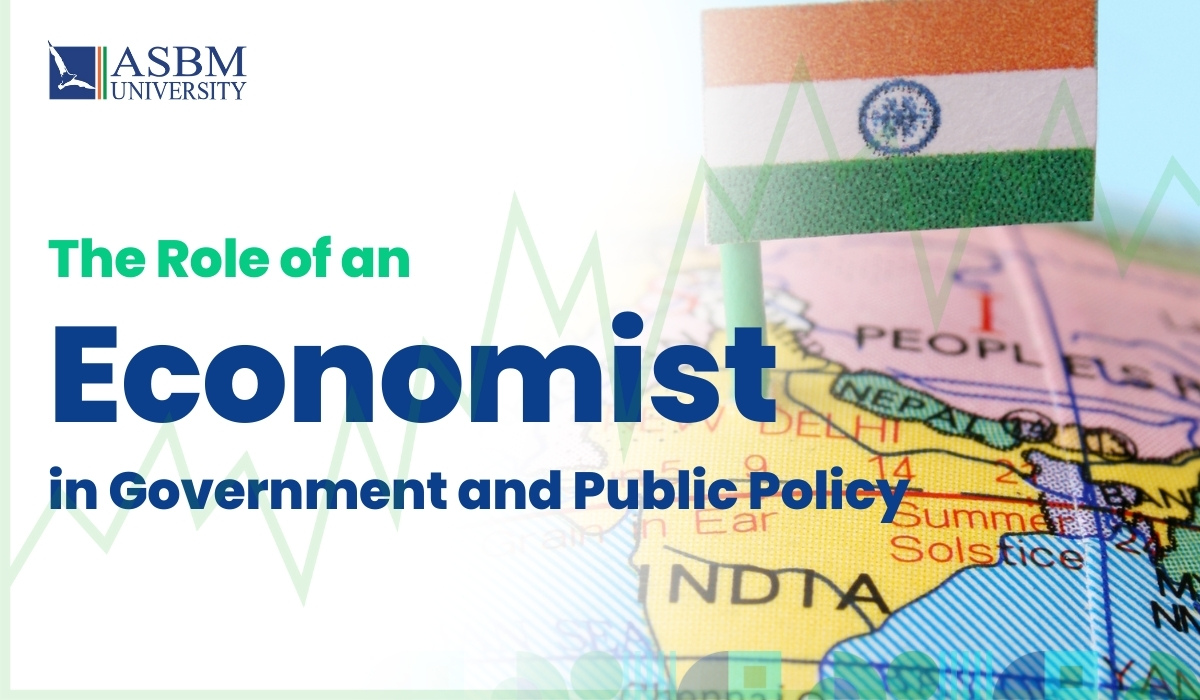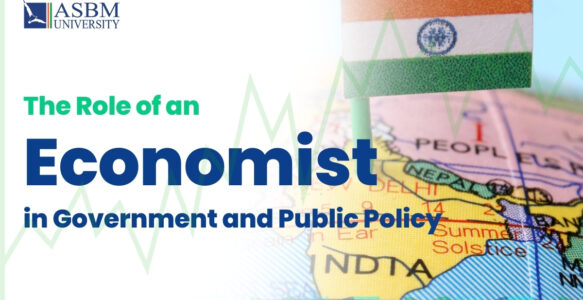The Role of an Economist in Government and Public Policy

Economics, often called the ‘queen of social sciences’, is more than just numbers and theories; it’s about understanding how societies use their limited resources. This field examines the complex interactions between human behaviour, market forces, and government policies. Economists play a crucial role in shaping a country’s future, especially in government and public policy.
In India, economists are key to creating policies that address challenges like inflation, unemployment, and economic growth. Their insights guide decisions on everything from budget allocations to long-term economic reforms. By helping the government make informed choices, economists ensure that resources are used efficiently, aiming to improve the lives of all citizens. This article highlights the important role economists play in India’s development and governance, making their work essential for the nation’s progress.
The Economic Landscape of India
India’s economic journey since independence has been one of remarkable transformation. From a newly independent nation grappling with poverty and underdevelopment to emerging as one of the world’s largest economies, India has navigated numerous challenges and embraced opportunities across different decades. This overview captures the key milestones in India’s economic evolution, highlighting how the country has adapted its policies and strategies to foster growth, development, and global integration. Each decade tells a unique story of resilience, reform, and progress, shaping the diverse and dynamic economic landscape that defines India today.
1947–1950s: Building a Foundation
Post independence after 1947, India faced significant challenges like poverty and inadequate infrastructure. The government introduced the Planning Commission and the first Five-Year Plan, focusing on agricultural development and energy. India adopted a mixed economy, with the government playing a key role in industries like steel, energy, and infrastructure.
1960s: Green Revolution and Growth
In the 1960s, India launched the Green Revolution to boost agricultural productivity, which helped address food shortages. Industrial growth continued with the expansion of public sector enterprises. However, the economy faced slow growth, unemployment, and inflation during this decade.
1970s: Nationalisation and Economic Challenges
The 1970s saw the nationalisation of banks, insurance companies, and major industries to promote social equity. However, the global oil crisis and political instability led to economic struggles, including high inflation. The government introduced poverty alleviation programmes, but their impact was limited.
1980s: Early Economic Reforms
In the 1980s, India began to gradually liberalise its economy, encouraging foreign investment and modernising industries. The focus on technology and IT set the stage for future growth. Despite some economic progress, India faced challenges like a growing fiscal deficit and external debt.
1990s: Major Economic Reforms
Faced with a severe economic crisis in 1991, India implemented major economic reforms, including reducing tariffs, deregulating industries, and opening up to foreign investment. The IT sector grew rapidly, making India a global leader in technology services. These reforms led to higher growth and greater global integration.
2000s: Rapid Economic Growth
The 2000s were marked by rapid economic growth, with India becoming one of the fastest-growing major economies. The country further integrated into the global economy, with significant growth in exports, especially in IT services. Infrastructure development was a key focus, supporting continued economic expansion.
2010s: Digital Transformation and Challenges
The 2010s began with strong economic growth, but challenges like slowing growth rates and rising unemployment emerged later in the decade. The government launched initiatives like Digital India, transforming the economy through digital payments and e-governance. Key reforms included the introduction of the Goods and Services Tax (GST).
2020s: Resilience and Recovery
The COVID-19 pandemic in the 2020s significantly impacted India’s economy, but the country showed resilience with recovery measures and a focus on vaccination. The government introduced the ‘Atmanirbhar Bharat’ initiative to boost domestic production and self-reliance. There is also a growing emphasis on digital transformation and green technologies for sustainable development.
The Economist as a Policy Maker
Economists in government are the architects of a nation’s economic blueprint. They analyse data, identify trends, forecast outcomes, and propose policies to achieve desired economic objectives. Their work spans a wide spectrum, from macroeconomic policies influencing the overall economy to microeconomic policies impacting specific sectors.
- Macroeconomic Policy: Economists in government play a pivotal role in formulating monetary and fiscal policies. They advise on interest rates, taxation, government spending, and exchange rates. Their recommendations influence inflation, growth, employment, and external balance. For instance, during economic downturns, they might suggest expansionary fiscal policies to stimulate demand.
- Microeconomic Policy: Economists also contribute to sector-specific policies. Agriculture, industry, and services are key sectors where their expertise is invaluable. They analyse market structures, competition, and government intervention. For example, they might study the impact of subsidies on agricultural productivity or the implications of trade liberalisation on the manufacturing sector.
- Social Sector Policies: The role of economists extends beyond the traditional economic sphere. They contribute to designing policies for education, health, and poverty alleviation. Cost-benefit analysis, impact evaluation, and resource allocation are crucial tools in this domain. For instance, economists can assess the effectiveness of government programmes like the Mahatma Gandhi National Rural Employment Guarantee Act (MGNREGA) in poverty reduction.
The Economist as a Researcher
Research is the backbone of economic policymaking. Economists in government engage in both theoretical and empirical research. They develop models to explain economic phenomena, test hypotheses, and evaluate policy outcomes. Their findings inform policy decisions and contribute to the broader body of economic knowledge.
- Economic Modelling: Economists construct mathematical models to simulate economic behaviour. These models help policymakers understand the potential consequences of different policy options. For example, they can model the impact of tax reforms on investment and growth.
- Data Analysis: Economists work with vast amounts of data to identify patterns and trends. They use statistical techniques to analyse economic indicators like GDP, inflation, unemployment, and trade. This evidence-based approach is crucial for effective policymaking.
Challenges and Opportunities for Economists in India
The role of economists in India is both challenging and rewarding. On one hand, the country’s complex economic landscape, with its diverse regions and socio-economic conditions, presents significant challenges. On the other hand, the rapid pace of economic growth and the government’s emphasis on evidence-based policymaking offer immense opportunities.
- Data Quality and Accessibility: Improving data quality and accessibility is a critical challenge. Reliable data is essential for accurate analysis and effective policymaking.
- Institutional Capacity Building: Strengthening the capacity of government institutions to utilise economic analysis is crucial. This involves training policymakers, providing technical support, and creating a conducive environment for research.
- Ethical Considerations: Economists must grapple with ethical dilemmas in their work. Balancing economic growth with social equity, environmental sustainability, and other societal goals requires careful consideration.
The Road Ahead
India’s economic journey is far from over. The country aspires to become a global economic powerhouse. To achieve this goal, the role of economists will become even more critical. They will need to anticipate future challenges, such as climate change, technological disruption, and demographic shifts, and develop policies to address them.
Economists are the unsung heroes who shape the economic destiny of nations. Their ability to analyse complex problems, propose innovative solutions, and communicate effectively is essential for good governance. As India continues its economic transformation, the demand for skilled economists will only grow. For students aspiring to make a difference, a career in economics offers a unique opportunity to contribute to the nation’s progress.
ASBM University: A Launchpad for Aspiring Economists
ASBM University offers a distinctive platform for students aspiring to carve a niche in the field of economics. The university’s commitment to academic excellence, coupled with industry-oriented curriculum, creates an ideal environment for nurturing future economists.
BA Economics at ASBM University
The BA Economics programme at ASBM University provides a strong foundation in economic theory, quantitative methods, and policy analysis. The curriculum is designed to equip students with the necessary skills to understand and analyse economic issues at both micro and macro levels.
- Core Economic Principles: Students delve deep into the core concepts of economics, including microeconomics, macroeconomics, econometrics, and Indian economy.
- Practical Exposure: The programme incorporates case studies, internships, and industry visits to bridge the gap between theory and practice.
- Soft Skills Development: Emphasis is laid on developing essential soft skills such as communication, critical thinking, and problem-solving, which are crucial for success in the professional world.
MA Economics at ASBM University
Building upon the undergraduate foundation, the MA Economics programme at ASBM University offers advanced specialisation in various economic domains. The programme focuses on developing research, analytical, and policy-making skills.
- Specialised Tracks: Students can choose from specialised tracks such as econometrics, development economics, environmental economics, or financial economics.
- Research Methodology: Rigorous training in research methodology equips students to conduct independent research and contribute to the field of economics.
- Industry Interface: The programme fosters industry interactions through guest lectures, workshops, and internships, providing students with real-world exposure.
Key Advantages of Studying Economics at ASBM University:
- Experienced Faculty: The university boasts a team of experienced and qualified faculty members who bring industry expertise into the classroom.
- Industry Collaborations: Strong industry linkages provide ample opportunities for internships, placements, and research collaborations.
- Infrastructure and Facilities: State-of-the-art infrastructure, including well-equipped libraries, computer labs, and seminar halls, supports the learning process.
- Focus on Holistic Development: Beyond academics, ASBM University emphasises extracurricular activities, personality development, and leadership skills.
By choosing ASBM University for your economics education, you lay a solid foundation for a successful career in government, research, academia, or the corporate world. The university’s commitment to providing a comprehensive and industry-relevant curriculum ensures that graduates are well-prepared to meet the challenges and opportunities of the dynamic economic landscape.



